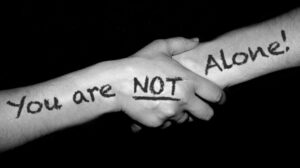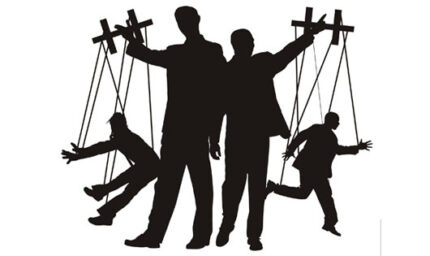 For most of us, coming out of a cult or religious “high control” group can be a frightening and traumatic ideal. We can feel overwhelmed with questions and doubt, and it’s not uncommon to experience intense mistrust of others and fear. We have chosen freedom over mental enslavement, but it comes at a high cost. However, it is the only road to true happiness.
For most of us, coming out of a cult or religious “high control” group can be a frightening and traumatic ideal. We can feel overwhelmed with questions and doubt, and it’s not uncommon to experience intense mistrust of others and fear. We have chosen freedom over mental enslavement, but it comes at a high cost. However, it is the only road to true happiness.
After finally leaving, it can be tempting to “hibernate.” We may attempt to turn the page, “move on” and create a new life for ourselves. This is important, but if we’re going to achieve this, it’s necessary to become truly free from all the negative and harmful thought patterns that were instilled in us. Otherwise, we could end up falling into despair and deep loneliness, which could lead us return to the Group or become prey to destructive behaviours such as alcoholism, other addictions, mental illness and even suicide.
It is possible to become free, in Christ, who tells us: “if the Son sets you free, you will be free indeed.” (John 8:36). Why is it then that so many of us who follow Him don’t feel free? There seem to be so many sermons and messages preached from the pulpit about how we should be feeling, that it can be very hard to admit that it’s not what we experience on a day to day basis.
Jesus also tells us: “If you abide in my word, you are truly my disciples, and you will know the truth, and the truth will set you free.” (John 8:31). Very sadly, many church leaders and organized religions who claim to “abide in” our Saviour and to teach “the truth” are in fact “ravenous wolves” (Matt 7:15).
Are we free to question them? Could we have an open debate with them, in public or in private, to discuss what they do, teach and how they behave? Surely, there must be some Groups whose leaders are open, transparent and humble enough to be willing to do this, but the majority put themselves up on a pedestal above public scrutiny.
This is the root of our lack of freedom, in my opinion. If we’re part of a High Control Group whose leaders seek to govern every aspect of our lives, how can we be free? And even when we manage to escape their grasp and get out, they’ve already infiltrated our minds, so they can carry on influencing our behaviour every day of our lives… Until we put a stop to it!!!
That is the aim of this book, in a nutshell. To identify the ways and areas in which the Group poisoned our minds, so we can gradually start to think for ourselves, and free ourselves from their toxic influence.
Contents:
[2024 NOTE: This blog is not currently available for viewing, so direct links have been removed.]
- Introduction
- Chapter 1: The Question of Control
- Chapter 2: My Story
- https://faithafterdeception.wordpress.com/2018/07/29/chapter-3-freedom-from-rage-and-regret/ Chapter 3: Freedom from Rage and Regret
- https://faithafterdeception.wordpress.com/2018/07/29/chapter-4-freedom-from-loneliness/ Chapter 4: Freedom from Loneliness
- https://faithafterdeception.wordpress.com/2018/07/29/chapter-6-freedom-from-abuse/ Chapter 5: Freedom from Legalism
- https://faithafterdeception.wordpress.com/2018/07/29/chapter-6-freedom-from-abuse/ Chapter 6: Freedom from Abuse
- https://faithafterdeception.wordpress.com/2018/07/29/chapter-7-freedom-from-self-censorship/ Chapter 7: Freedom from self-censorship
- https://faithafterdeception.wordpress.com/2018/07/29/chapter-8-freedom-from-numbness-and-despair/ Chapter 8: Freedom from numbness and despair
- https://faithafterdeception.wordpress.com/2018/07/29/chapter-9-freedom-from-the-judgmental-mindset/ Chapter 9: Freedom from the judgmental mindset
- https://faithafterdeception.wordpress.com/2018/07/29/chapter-10-freedom-from-shame/ Chapter 10: Freedom from shame
- https://faithafterdeception.wordpress.com/2018/07/29/chapter-11-freedom-from-transactional-and-coercive-relationships/ Chapter 11: Freedom from transactional and coercive relationships
- https://faithafterdeception.wordpress.com/2018/07/29/chapter-12-freedom-from-the-pressure-to-conform/ Chapter 12: Freedom from the pressure to conform
- https://faithafterdeception.wordpress.com/2018/07/29/chapter-13-freedom-from-enslavement-to-wealth/ Chapter 13: Freedom from enslavement to wealth
Index:
- https://faithafterdeception.wordpress.com/2017/11/14/helping-cult-members-wake-up-from-their-indoctrination/ How to help indoctrinated cult victims to break free
- https://faithafterdeception.wordpress.com/2016/08/30/why-do-people-return-to-a-sect-after-breaking-free/ Why do people sometimes return to a cult?
********
Shop at our Amazon store! As an Amazon Influencer, this website earns from qualifying purchases.

 ********
********






